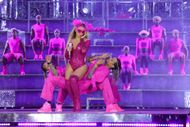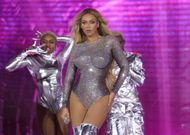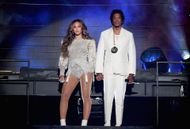Born September 4, 1981, in Houston, Texas, Beyoncé Knowles-Carter was once a little girl with a big dream to grow up to be an international phenomenon that changed the very face of what it means to be an artist in the 21st century.
Her rise from initial performances to global superstardom is distinguished not just by singing greatness and originality, but by a zealous striving to take back her own story and elevate others while doing so.
Well beyond her top-of-the-charts records, Beyoncé has left behind a legacy of empowerment, cultural pride, and creative autonomy, rendering her a trailblazer in music and a reigning behemoth in the wider realm of pop culture.
What sets Beyoncé apart is not only the scale of her art but the intent behind it. Each effort, whether the cinematic excess of Lemonade, the deeply personal ruminations in 4, or the cultural touchstone-ing of Black identity in Black Is King, is accompanied by a message that goes beyond entertainment.
She uses her platform to upend assumptions, give voice to silenced constituencies, and redefine the boundaries of what pop music can utter. Beyoncé has developed over time from performer to auteur. These crafting experiences blend music, film, and activism, all while maintaining an air of mystery that only serves to enhance her power.
Let's get a closer examination of Beyoncé's career, not as a timeline of records and awards, but as a research-based path of artistic development. She doesn't progress through leaps and bounds, but through subtle changes in sound, image, and authorship. Beginning as the lead singer for Destiny's Child, she becomes a world solo artist in a way that illustrates increasing regions of creative autonomy and self-fashioning.
What's fascinating in specifically, is how she transitioned from being defined by the industry to defining the industry itself. Looking at her body of work provides a glimpse of the way she's still utilizing music as a tool for both personal expression and as commentary on a wider culture.
The rise of Beyoncé
Beyoncé's professional path was from the beginning shaped by a family where fantasy was wed to discipline. She grew up in Houston, where music, fashion, and looks dominated her life. Her mother, Tina Knowles, controlled the group's appearance on stage in terms of fashion, and her father, Mathew Knowles, took care of career direction matters in an entrepreneurial manner.
Prior to becoming a superstar, Beyoncé was already a performer, with initial vocal talent at age eight in local talent shows. Experience was not singing per se, but more the cultivation of self-confidence, stage performance, and work habits.
Destiny's Child finally came into existence out of the group that had gone by the name of Girl's Tyme, which, having undergone roster turbulence and development over the years, materialized in the mainstream at the close of the '90s.
With such hits as No, No, No and Say My Name, the group of Beyoncé, Kelly Rowland, and subsequently Michelle Williams reached stardom, laying the groundwork for solo stardom by Beyoncé and establishing her as a leading contemporary figure in R&B.

As Destiny's Child gathered momentum more and more, it became clear that Beyoncé was the de facto lead singer of the group, both in terms of vocals but also in dominating the sound and image of the group.
In the background, she was already forging the work ethic that would serve her well in later years as a solo artist: hyper-vigilant attention to detail, storytelling ability, and knowledge of how to touch people on an emotional level.
Even after being pushed around by the crowd, she could balance herself precariously on the brink of the instant, and surprisingly always starved for more. And when the group did have their turn to come out from behind the wings, Beyoncé didn't seize the moment so much as just take back her path, redefining what it meant to be a one-hit wonder from being in a group with direction and intent.
Read More: The evolution of Madonna: A musical odyssey
Beyoncé's musical journey
Beyoncé's solo career was nicely established in 2003 with the arrival of Dangerously in Love, catapulting her from her work with Destiny's Child to international sensation all on her own. The disc was a calculated study in eclecticism, with R&B, pop, and hip-hop sensibilities all being grafted onto it and featuring Crazy in Love and Baby Boy to demonstrate its breadth and performer skill.
Her combative live presence had long been established early on, and Dangerously in Love set the template for a record-breaking solo artist career. Her second album, B'Day (2006), was where Beyoncé was securely established in her solo persona with unshakeable confidence. Anthemic tracks on the album, Irreplaceable and Déjà Vu, both broke on critics' and commercially, placing her on a par with some of the music legends as an artist to be taken seriously.
Her crossover popularity and versatility in singing number one singles also contributed to her place, and her increasing mastery over her music meant that her entry as a multi-dimensional artist. Her third album, I Am. Sasha Fierce (2008) was the peak. Her use of alter ego Sasha Fierce enabled Beyoncé to explore new ground in her work.

The duality of introspective I Am and war-fighting, battle Sasha Fierce personalities enabled her to produce a chain of personas, personas she lived through brutal ferocity. Not One Thing and Halo were not only number one singles but cultural touchstones, combining fashion, dance, and social activism.
It was where Beyoncé became a worldwide pop sensation, power and vulnerability blending into each other in a way that reached every heart on the planet.
In March 2024, Beyoncé released Cowboy Carter (also titled Act II: Cowboy Carter), her eighth studio album and arguably the most genre-transgressive work of her career. Ranging widely over Southern-style music, country, folk, Americana, zydeco, blues, psychedelic soul, and bluegrass, the album is an unapologetic, a deeply personal salute to the music that shaped her Texas childhood.

Rather than adhering to a single genre, Cowboy Carter dismantles the definition, redefining country and Southern music through a Black woman's eyes. It was generally critically praised, making numerous year-end best-of lists and inciting controversy over race, authenticity, and genre in American music.
The album's influence was further cemented when it received 11 nominations at the 67th Annual Grammy Awards, country to pop, Americana, and melodic rap, tied for the third-most nominated album in Grammy history and most nominated by a female.
With Cowboy Carter, Beyoncé not only expanded her creative heritage but also made history, surpassing her husband Jay-Z's record to be the most Grammy-nominated artist ever with 99 career nominations.
The groundbreaking success of Lemonade
But with Lemonade (2016), did she draw the lines for the remainder of Beyoncé's life, marking her as an artist who would never be afraid to blur the boundaries of music, art, and society? In contrast to her other bodies of work, Lemonade was a fiery search for identity, healing, and betrayal in a visual album movie. The album was unparalleled in thematic seriousness, in addition to its blinding search for womanhood, race, and Black culture.
Its largest individual song, Formation, was a song of survival and political action, grieving structural oppression while recuperating Blackness. Formation was an eye-catching work, fusing visceral imagery of blackness, police brutality, and Southern pride to make an irrefutable case on music and social activism intersectionality.

Lemonade was a cultural signpost, demonstrating that Beyoncé could convert personal failures into a public, artistic voice heard by millions. With Lemonade, Beyoncé shattered convention, no longer singing but also making space for discussion and transformation.
Cheating, forgiveness, and empowerment were not only themes within the album but also in a short film, a book of poems, and interviews, an entire experience for the listener. In doing so, she became one of the most influential and revolutionary artists of her generation.

The Lemonade win was not only a win in the music world, but a historic cultural moment in which Beyoncé showed she can reshape the crossroads of pop music, art, and activism.
How Beyoncé redefined cultural power through visibility and voice
Beyoncé's influence goes far beyond the purview of her music because she has gone on to employ her talent and exposure to advance issues of identity, empowerment, and entrenched oppression to the center of national debate.
Instead of confining her work to entertainment, she has sought to embed her labor in activism, and most powerfully, in albums such as Lemonade (2016), which combined autobiographical story with unflinching explorations of power, gender, and race.
The album did not simply document solo betrayal; it spoke the language of the collective Black women's experience and functioned as a lightning rod for controversy about representation and power. Outside of the recording studio, Beyoncé has also made advocacy the focus of her public persona.

Her Black Panther Party-inspired Super Bowl 50 halftime performance attire marked a turning point in her evolution from international performer to cultural activist.
Either within her activism, her entrepreneurial pursuits, or within the politicization of her photographs and writings, Beyoncé has rewritten the model of artist-activist of our era, mashing up popular accessibility with a steady commitment to definiliarizing and authenticating the subaltern voice.
In 2006, B'Day was a career rebirth for Beyoncé, a strength-fed, defiant change, brought on by necessity. Composed and recorded in artistic fervor, the album pulsed with live electric guitars and fiery vocals, shamelessly borrowing from funk, soul, and vintage R&B.

Get Me Bodied and Green Light were not dance singles alone; they were declarations of independence and self. Instead of discovering femininity in softness or restraint, Beyoncé moved from power to movement to sensuality, putting womanhood into high gear and unapologetic.
It was not a quiet one, it was an intentional, strategic reversal of the women's rules in pop. Virtually, she countered the energy of the music with a brazen and expressive style: risk-taking, fashion-violating, tight choreography performances that solidified her status as larger than a singer, she was an in-house creative director now.
B'Day was not an album about celebrating; it was about taking over, voice, image, and message. In so many ways, it paved the way for the feminist undertones that would become her trademark later in life, especially as she grew more politically and socially conscious with albums such as Beyoncé and Lemonade.
Beyoncé's legacy
Beyoncé's legacy is not founded in awards or salability, though; it lies in her power to reshape the terrain of popular culture and never sacrifice her authenticity. For decades, she has continued to set the standard higher, not just musically but with the visual, political, and cultural content of her work.

Whether pushing boundaries of industry convention, giving voice to marginalized communities, or recontextualizing genre and performing parameters, Beyoncé has knowingly employed her platform. Her impact extends far beyond the stage, shaping fashion, film, activism, and international dialogue on race, feminism, and identity.
Instead of jumping on trends, she's been diligent to create ones of her own, inspiring her peers and those to come. Taking a step back to consider her career as a whole, Beyoncé isn't about stardom; she is the definition of growing with intention and leading with vision in a changing cultural landscape.
Beyoncé's discography is a blend of transformation, meaning, and unapologetic redefinition. From the teen-stage diva in Destiny's Child to dismantling art's rules with Lemonade and Cowboy Carter, she has never stopped using personal expression and translating it into cultural signifiers.
Beyoncé has never been satisfied with merely entertaining, she has employed music as a means of storytelling, disrupting the paradigm, and redirecting the cultural discourse. At every move, she has expanded her art, expanded her base, and cemented her position among the most powerful musicians of her generation. Her own path is not yet complete, but what she has achieved so far is a testament to the life-changing potential of music when coupled with vision, values, and purpose.
Keep reading SoapCentral for more informative content!
Also Read: Justin Bieber’s evolution: A journey through music and fame
